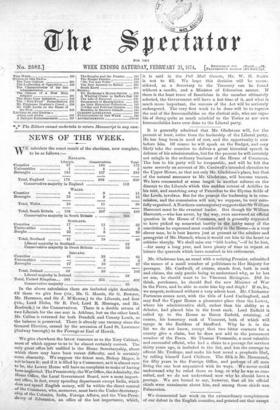Mr. Gladstone has, as usual with a retiring Premier, submitted
the names of a small number of politicians to Her Majesty for peerages. Mr. Cardwell; of course, stands first, both in rank and claims, the only puzzle being to understand why, as he has no son, he should want to be Viscount Rivington. Did he think, perchance, he should find the new Minister of War in the Peers, and be able to smite him hip and thigh ? If so, he, we suspect, reckoned without a very adroit host. Mr. Chichester Fortescue comes next, with the title of Lord Carlingford, and may find the Upper House a pleasanter place than the Lower, where his administrative skill, rather than his ability as a debater, had placed him in the front rank. Lord Enfield is called up to the House as Baron Enfield, retaining, of course, his honorary rank of Viscount, both of which will merge in the Earldom of Strafford. Why he is iu the list we do not know, except that two bitter contests for a county give a claim, but he does not add to the permanent number of the Peers. Sir Thomas Fremantle, a most valuable and successful official, who had a claim to a peerage for services thirty years ago, is included in the list, and has the courage to affront Mr. Trollope, and make his best, novel a prophetic libel, by calling himself Lord Chiltern. The fifth is Mr. Hammond, for fifty years in the Foreign Office, and perhaps of all men living the one best acquainted with its ways. We never could understand why he ruled there so long, or why he was so con- sulted, and we ,do not understand now why he should have a peerage. We are bound to say, however, that all his official chiefs were unanimous about him, and among those chiefs was Palmerston.


































